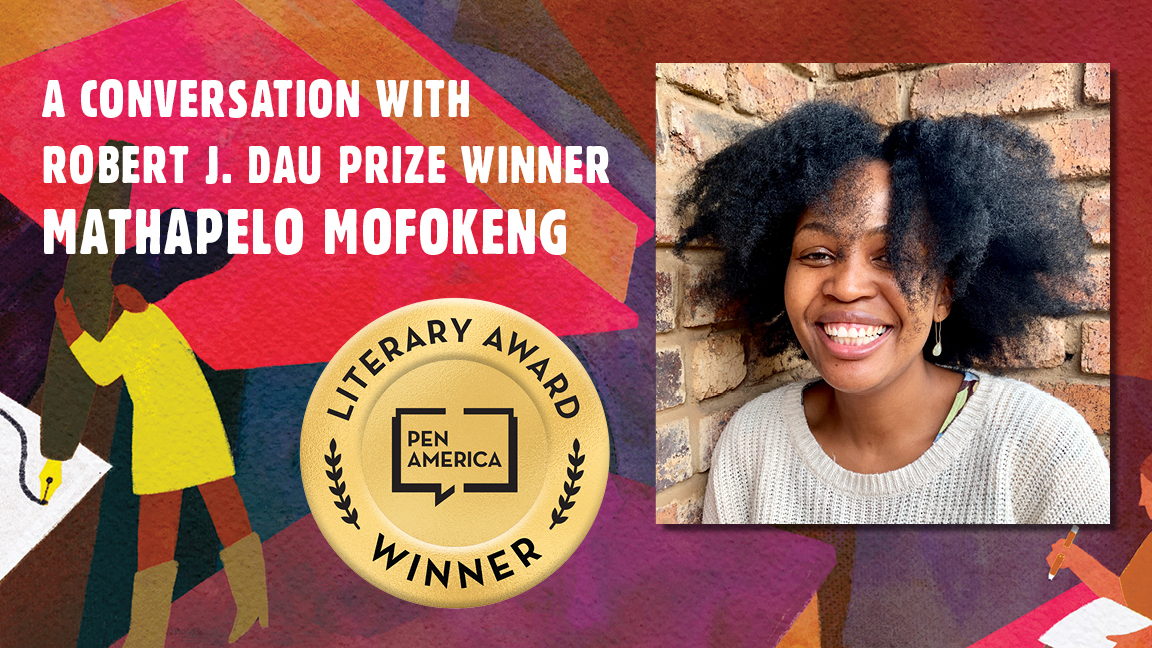Don’t Write Alone Interviews
On “getting creatively lost”: Robert J. Dau Prize Winner Mathapelo Mofokeng
Learn about Mathapelo Mofokeng’s short story “The Strong-Strong Winds,” which was selected for ‘Best Debut Short Stories 2021.’
Best Debut Short Stories 2021: The PEN America Dau Prize is the fifth edition of an anthology celebrating outstanding new fiction writers published by literary magazines around the world. In the recent weeks, we’ve featured Q&As with the contributors, whose stories were selected for PEN’s Robert J. Dau Short Story Prize for Emerging Writers and for the anthology by judges Nana Kwame Adjei-Brenyah, Kali Fajardo-Anstine, and Beth Piatote.
Mathapelo Mofokeng is a writer from Johannesburg. In 2018 she completed an MA in scriptwriting at the London University of Goldsmiths after being awarded the Chevening Scholarship. Her short films have screened at BFI Soul Connect, Underwire, London Shorts, and Aesthetica, among others. Her short story and essay publications include adda , Popshot Quarterly , and Goldsmiths Press. Mathapelo was long-listed for the 2021 Commonwealth Writers Short Story Prize, and is currently working on her debut composite novel, The Ministry of Sadness.
“The Strong-Strong Winds” was originally published in adda. Find a brief excerpt below:
In the kitchen sits a cooler box. In it, a Fanta. The Fanta in the cooler box is not mine. Neither is it my grandmother Nkhono’s. It belongs to my father, Nkhono’s fourth son. And today we will pour it over his grave to quench his thirst. We were meant to visit him yesterday, but Nkhono said the weather wasn’t good and the winds were too strong. I think she meant he’d enjoy it more on a boiling hot day like today. It’s always the same at Avalon Cemetery: the red sand, the unkempt weeds that Nkhono concerns herself with, the drinking fountain that promises no water, and the lump that sits in my throat. The walk is always quiet. Only the steady thud of the bag of Fanta bumping against my leg. The steady thud reminding me to snap out of it.
Where did you find the idea for this story?
adda released an open call inviting writers from the commonwealth to contribute stories to their online magazine issue on climate change. During that period I was working for an organization doing extensive research on the fragility of Africans in the face of climate change. I had been sitting with a lot of uncertainty around my aspirations given the impending doom, and resentment around the injustice of the climate crisis.
In your story we find the characters roaming about Avalon Cemetery in search of a particular plot, which gives the story a sense of containment while also allowing the reader to become deeply immersed in this world. What drove your decision to set the story in a singular location?
The story being set in a singular location wasn’t something I had given much thought to until now. When I think back to that time, a few weeks before writing the story I had accompanied my friend to Avalon Cemetery to attend a funeral. This friend of mine was accompanying her friend. It is common in South Africa to tag along with someone to a funeral. On the one hand, we spend a lot of time in cemeteries to pay our respects to the deceased, but in other ways, I think these visitations allow us to be in conversation with our personal and collective grief. It could be that while I was writing the story, I was processing emotions that only a cemetery seemed adequate to embrace.
Let’s go back to the fact that you wrote “Strong-Strong Winds” in response to a themed open call on climate change. Why did you choose to address climate change from this perspective? What do you hope readers will take away from this story?
The perspective was shaped around my inability to engage with what life will really look like if we don’t deal with the existential threat of climate change. I felt more able to write about the terrible small thing that could happen behind the big catastrophic event.
What was your writing process like for this story?
The process was full of surprises. “The Strong-Strong Winds” was my first attempt at writing a short story in prose, so there was no informed method behind writing it. I didn’t know the rules of the craft, which led to me constructing a story outside of traditional planning. I would have an idea and see where the thought led me. It involved getting creatively lost, but trusting that I would find my way. It was great fun.
How has the Robert J. Dau Prize affected you?
The Robert J. Dau Prize has presented new and unexpected pathways for both myself and the story. The story has moved through the editorial hands of Yuka Igarashi and Sarah Lyn Rogers, amd it’s now in print, reaching new readers, and on its own course. I have gained representation, connected with an inspiring community of writers from the 2021 cohort, and felt affirmed.
What is the best or worse writing advice you’ve received, and why?
The best writing advice I’ve heard was from a podcast episode I listened to, which was to allow oneself to be bad at something in order to become good at it.
Finally, where do you discover new writing?
I rely on the recommendations of friends.
